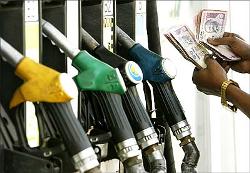
Finance minister Pranab Mukherjee is believed to be in favour of giving state-run oil firms freedom to fix price of petrol and diesel in step with cost, as he feels the current moderate global oil rates may be the last window India has to deregulate fuel pricing.
"We are trying our best to see that prices are not raised," Deora told reporters in New Delhi.
"But a rate hike may become inevitable as government's limited financial resources are not enough to meet the revenue lost on selling petrol, diesel, LPG and kerosene below cost."
The Cabinet had in July 2009 decided that government will meet all of the under-recovery (revenue loss) on domestic LPG and kerosene either through bonds or in cash and the same on petrol and diesel was to be met by upstream companies like ONGC," he said.
While Oil and Natural Gas Corporation, Oil India and GAIL borne the entire Rs 8,364 crore (Rs 83.64 billion) under-recovery on petrol and diesel in first three quarters of current fiscal, the government has agreed to give only Rs 12,000 crore (Rs 120 billion) in cash against the Rs 20,989 crore (Rs 209.89 billion) revenue loss on cooking fuel in April-December.
"We will be meeting finance minister tomorrow to see how this under-recovery is to be met," Deora said adding a decision on fuel pricing was likely only after the Kirit Parikh committee submits its report this week.
Freeing auto fuel pricing would mean a hike of Rs 4.72 a litre on petrol rates and Rs 2.33 per litre on diesel prices as Indian Oil Corporation, Hindustan Petroleum and Bharat Petroleum sell them at rates lower than the imported cost. Deora said there were some people who were advocating freeing petrol and diesel prices while the government and upstream companies together subsidised LPG and kerosene.
"We will decide on the pricing after due consultations on the Parikh committee report," he said. "Petroleum ministry is not a private company that can decide on such issue by itself.
"Government is extremely conscious of the effect any increase in fuel prices. . . the cascading effect of a Rs 2 per litre increase in diesel prices, for example, would be felt on prices of food items," he said.
"But there was an urgent need to find a permanent solution to this recurring problem of under-recoveries." Petroleum secretary S Sunderashan said it was estimated that the total revenue loss on the four products this fiscal would be over Rs 45,500 crore (Rs 455 billion).
The three firms are projected to lose Rs 17,422 crore (Rs 174.22 billion) on kerosene and Rs 14,152 crore (Rs 141.52 billion) on LPG.
The finance ministry's dole of Rs 12,000 crore (Rs 120 billion) towards cooking fuel subsidies was for the entire fiscal, he said adding in the first nine months alone there was an unmet portion of Rs 8,989 crore (Rs 89.89 billion).
After taking into account the fourth quarter, finance ministry needs to give an additional Rs 19,574 crore (Rs 195.74 billion).
Deora said the report of Parikh committee, the third panel on the issue, is expected this week.
"There are suggestions that petrol prices should be freed immediately while there can be dual prices for diesel -- market rates for bulk consumers like Railways and subsidised rates for fuel sold from petrol pumps," he said adding, the issue would be decided after getting the committee report.
Sundareshan, who took over as the new petroleum secretary said on Sunday, "Policy decisions are essential and required to ensure that oil marketing companies do not suffer on account of under-recoveries (on fuel sales).
"Credible policy decisions are needed to ensure that financial health of oil marketing companies is sustainable," he said.
He, however, did not categorically state that the subsidy burden on upstream firms ONGC, OIL and GAIL -- who currently meet all of the revenue retailers lose on petrol and diesel -- would not be increased in case finance ministry were not to issue further more subsidy.
"Government will take a considered view on pricing of petroleum products," he said, adding his ministry would continue to pursue with finance ministry for meeting the unmet portion of the LPG and kerosene subsidy.
Asked specifically if subsidy burden of upstream firms would increase, he said: "How do we know what will happen in the fourth quarter."